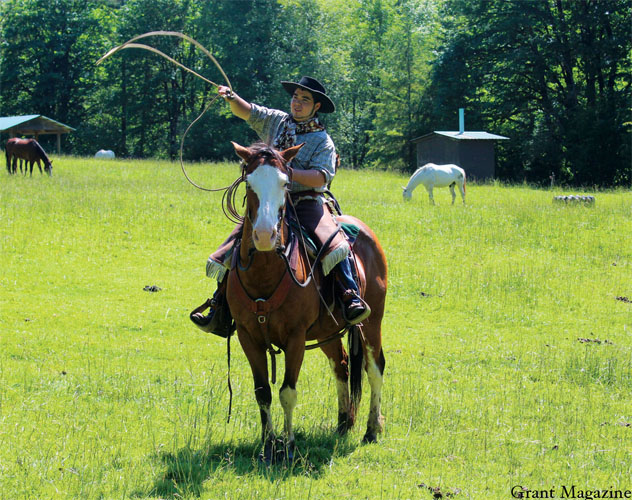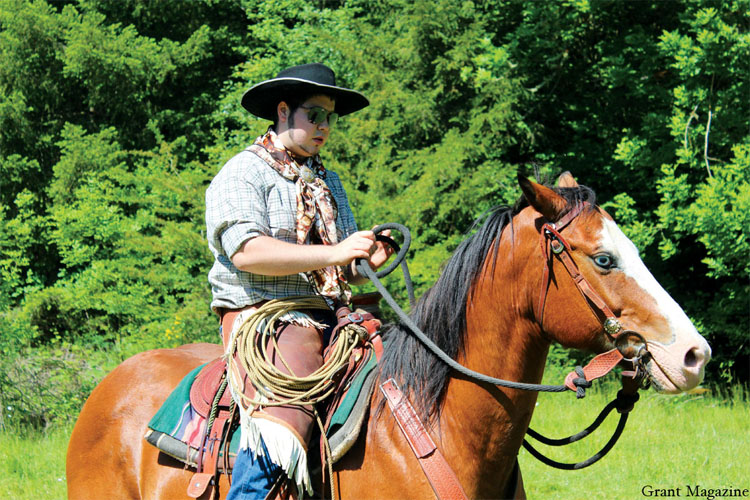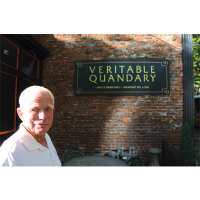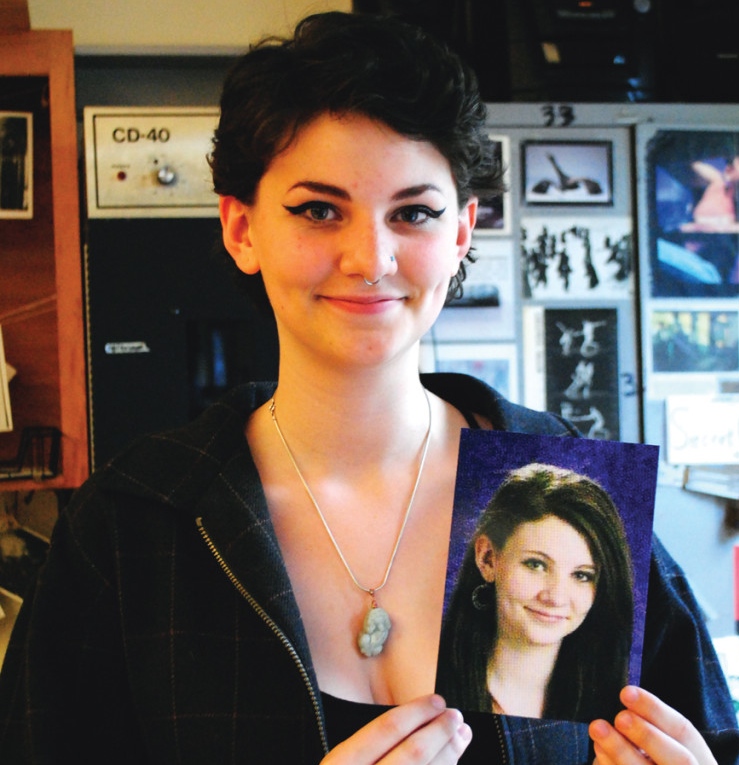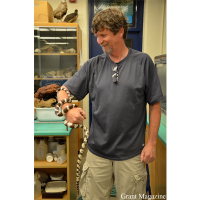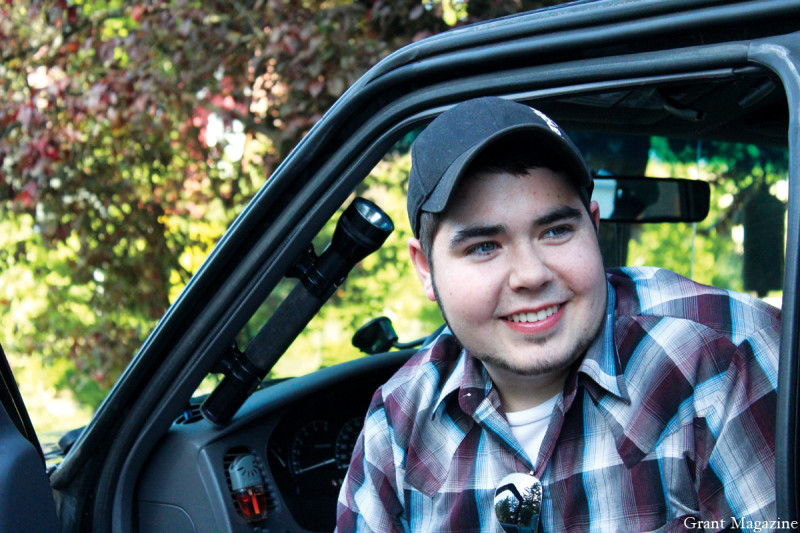
It’s 11:12 a.m. on a Monday. The bell rings for lunch and most students sit down to eat or disperse toward the local food joints.
Grant High School senior Morgaen Schall gets in his black pickup truck and drives downtown to work. He throws on a pair of boots, jeans, a flannel shirt and a black cap that reads DeTemple – Plumbing – Heating – Air.
He works as a shop assistant at DeTemple so he can pay for the insurance and gas that his truck needs. But the main reason is that he loves to work with his hands. He couldn’t imagine it any other way.
Schall loves farming, horseback riding and the outdoors. He’s a regular at a ranch near Molalla, where he rides and trains 80 head of horses. Every May, he drives to a rodeo in eastern Oregon, and he has a knack for jobs that require physical exertion.
But not too many of his fellow Grant students know that. After being teased profusely in middle school about his life as a modern day cowboy, he decided not to show his identity when he came to Grant. He took up the disguise of a city kid, and he hasn’t taken it off since.
Now, as he finishes his last year of high school, he can’t wait to shed the community that has been so critical of his lifestyle. “I don’t want to live somewhere where I have to live in that façade. I don’t want to have to do that anymore,” he says.
Schall was born on Feb. 4, 1996. His two siblings, Keenan and Linnaea, are twins, seven years older than he is. His mother is a teacher and his father is a project estimator. They had been married since 1988.
Schall went to a Montessori school in Portland. During that time, his parents also sent Schall to a farm camp near Yamhill, where he learned to milk goats, make yarn and appreciate the outdoors. It was there that he rode a horse for the first time.
Throughout his childhood, his family took frequent trips to eastern Washington, where Schall’s godparents lived in a patched-up house with a little creek that trickled through the property and dried up in the summer.
His godparents made a living raising chickens and turkeys for meat and eggs, and Schall often helped out around the farm when he visited. That was where he learned the true meaning of necessity. “They had no TV, Internet, or any amenities like that. I learned you need to work with what you have,” Schall says. “I learned you don’t need everything to be happy.”
He attended Alameda Elementary School and joined a Cub Scout troop in first grade. In fifth grade, he graduated to the Boy Scouts and joined Troop 107. Schall enjoyed the camping trips and other excursions they would take. But eventually, because he hated the meetings and his lack of independence on trips, Schall quit.
At the same time, Schall started to gain a little weight and he got a bad case of acne. His parents thought bullying would be inevitable in middle school, so they sent him to Sunnyside, where they assumed the community was more accepting.
Schall’s siblings had gone to Beaumont Middle School, where they were teased constantly. They had enjoyed Alameda but felt the Beaumont students were of an ilk that was more judgmental and rude. They warned Schall of what was bound to happen.
“I don’t want to live somewhere where I have to live in that façade. I don’t want to have to do that anymore.” -Morgaen Schall
So Schall enrolled at Sunnyside. “Sunnyside has a wide variety of characters, so we thought Morgaen would fit right in,” recalls his mother, Lecia Schall.
And he did, for a while. He played basketball and baseball and worked on the tech team. He was also on the sounds group for school announcements.
Then in eighth grade, Schall went to a ranch in Scotts Mills, about an hour southeast of Portland, to wrangle for the first time without adults. During the winter, Boy Scout troops went to the ranch for trail rides on weekends. In the summer, it was made to look like a town in the Wild West and became the temporary home for several Cub Scout troops.
There was a dining hall, a trading post, flagpoles and cabins, all cradled in several hundred acres of the valley. The ranch quickly became a second home for Schall.
“I always wanted to be a cowboy,” he recalls. “The ranch is where I started to pick up that persona.”
He returned to the ranch often, working as a wrangler, lifting bales of hay and training horses. “You can really bond with a horse. A horse can teach you a lot more than you know,” he says. “It taught me patience and it taught me to communicate. The connection I get with a horse is often stronger than one with a human because you have to communicate through mostly body language instead of words.”
Schall left every Friday as soon as school was out and drove to the ranch where he would stay for the weekend, returning home every Sunday night. “The people at the ranch have always been my second family,” he says.
Jason Rydman, a close friend who has worked with Schall at the ranch for years, sees the passion he puts into the job. “We work with horses and teach kids how to ride them,” he says. “You can tell that he has an all-around care for them.”
Schall was comfortable at the ranch, but he paid an undue burden at school. Frequently, he was teased about being a country kid and a cowboy. When he posted pictures of himself with horses and showed the world what he loved to do, his classmates called him a redneck and pulled up country songs on school computers, assuming he liked the music.
“I had found out who I wanted to be in middle school,” he says. “I had found a passion for horses and the country. What bothered me most was that they teased me most for the thing that made me the happiest.”
On top of that, Schall had weight problems and wore braces, things that make adolescence problematic for anyone.
“I was teased about everything,” says Schall. “But it was the weight that really pushed my insecurities over the top. I was really glad when middle school was over.”
When high school began, Schall didn’t want to take any chances. The bullying had gotten to his head.
The first thing he asked himself was: What am I going to wear? He was most comfortable in Wrangler jeans, a button up shirt, work boots and a hat. That had to change.
He decided he would dress exactly how a typical high school student would. He bought a couple pairs of Levi’s and a pair of inconspicuous Nike shoes that he kept as clean as he could.
On English assignments that required him to write about important influences and events in his life, Schall avoided describing his country-loving identity out of fear that his façade would be broken.
“It speaks to Grant and how we can imagine there’s one way to be,” says Dylan Leeman, Schall’s freshman English teacher. “You wouldn’t think a love for horses and country would need to be kept a secret. But here, for some reason, it does.”
Of course, his friends from Sunnyside knew and didn’t fail to tease Schall about his outside life in class. But he managed to keep most of it a secret, successfully staying away from the bullying he forecasted high school might bring.
It came with a cost. Schall had very few friends throughout high school, especially his freshman and sophomore years, and he very rarely opened up.
But there was one exception: Andrew Davidson, a classmate in his freshman community. “A lot of people found his lifestyle kind of strange and he didn’t have many friends,” Davidson says. “But you have to take into consideration that he wasn’t into the social scene because he was living a completely different life.”
The summer before his sophomore year, Schall’s brother, Keenan, introduced him to an annual rodeo in Jordan Valley. They camped there and socialized with others who had similar interests.
The rodeo was a traditional one. There were no professional cowboys, no advertisements and no tourists. Workers and farmers came from across the state to compete for the weekend and make a few extra bucks. “Real cowboys,” says Schall.
As 10th grade went on, so too did his ability to open up. At one point, he told a table group about the rodeo he liked to go to. He remembers them thinking it was stupid and asking why he would go if he wasn’t participating. He never mentioned it again.
Around the same time, Schall met Rayleen Caldwell at the ranch. It was her first time there, riding and tending horses as an intern. They began dating a few weeks later, but there was one major problem: Schall was 15. She was 18. The administration at the ranch took issue with the age gap, spurring Schall to stop working there in early spring 2012.
The two broke up in May that year.
Caldwell didn’t think Schall’s façade was necessary. “I think a lot more people would have liked him for who he was than he thinks they would have,” she says now.
Schall got a job at Multnomah Falls where he worked weekends at the snack bar. It became a permanent gig and Schall made the 35-minute commute to the falls every day to work. “That summer, I grew up and became independent,” Schall says. He and Caldwell got back together, too.
As junior year came around, Schall became less stringent about wearing city-kid clothes every day. “My sophomore and junior year, people started to not care about who I was outside of school,” he says. “I realized that I was one of a kind. If people didn’t like it, sucks for them. It was what was going to make me happy.”
This year, Schall started to shed his costume and embrace his true self.
In December 2013, Schall got an offer from his dad’s employer, a mechanical contractor called DeTemple that specializes in plumbing and heating. He started working there part time as a shop assistant, and now he clocks about 20 hours a week delivering parts to job sites.
His reasons for working so much? “I like having a car,” says Schall. “My parents said I needed to pay for my own insurance, gas. But it also just felt good to not be in class or watch television. It just felt good to be using my hands.”
He took four courses this year, including two teacher’s assistant classes, which meant he had time to work.
He is living with his mother in a home near Beaumont and his father lives in East Portland.
His mother, a substitute working to get her master’s degree, wasn’t a fan of her son’s school schedule, but she accepted it. “He’s wasted a lot of his education opportunities,” she says. “But he knows what he wants to do.”
Davidson agrees. “He hasn’t taken full advantage of school but it’s definitely worked for him,” he says. “He goes unnoticed because he doesn’t care about glory. He just does what he loves to do.”
In his Government and Economics class, Schall was set apart from his liberal classmates by his political views, especially on gun control. He’s completely against it, he told them. In his English thesis, Schall wrote that the Second Amendment is relevant today for self defense, self-protection of constitutional rights and hunting. He says he plans to carry a legally concealed weapon for protection when he turns 21.
“It’s hard to share because most people don’t respect that,” says Schall. “Many people think they’re open-minded, but only to the things we accept as Portland. They see people in the street smoking pot or with purple hair and they accept it. But for some reason, if they see a person who rides horses, wearing a cowboy hat, they don’t accept it.”
“He goes unnoticed because he doesn’t care about glory. He just does what he loves to do.” -Andrew Davidson
Next fall, Schall will join a union and get into an apprenticeship through IBEW Local 48, a local electricians union. He will be sponsored by an electrical contractor, working four days a week while taking classes on the fifth day. Five years down the road, he estimates he’ll be earning about as much as someone with a college degree.
“I will be proof you can make just as much money as someone with a degree without going to school,” he says. “And I won’t be in debt.”
Eventually he hopes to buy a large ranch outside of Portland where he can tend to horses. He knows he can support the country lifestyle and a family on an electrician’s wages.
Caldwell, whom Schall has been going strong with for nearly two years now, wants the same thing: cattle, horses and eventually marriage.
And she knows Schall will provide it. “He doesn’t just talk,” she says. “He full-throttle pursues what he wants and won’t be satisfied with anything less.”
And he’s been fully able to embrace his lifestyle now. “In a city, you get caught up. Life moves fast,” Schall says. “In the country, I can slow it down and be happy with what
I have.” ♦

